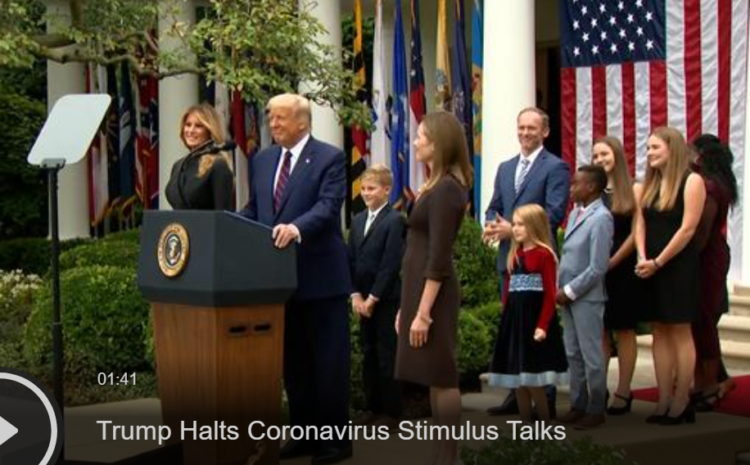
Trump halts Coronavirus stimulus talks
McConnell has always been an obstacle to an agreement between Pelosi and the White House, with the Kentucky Republican mostly staying on the sidelines as the speaker and Treasury Secretary Steve Mnuchin have tried ― and failed ― for months to find a compromise on another coronavirus relief bill.
But with Pelosi and the Trump administration finally making strides just two weeks before Election Day, McConnell has finally started lobbying against a deal.
A senior GOP aide told HuffPost on Tuesday that McConnell had informed Senate Republicans that he advised the White House not to finalize an agreement before the Nov. 3rd election, warning President Donald Trump that adding a major measure to the legislative calendar now could derail the confirmation of Judge Amy Coney Barrett to the Supreme Court.
Such a warning is, of course, outlandish. Barrett’s confirmation hasn’t been in doubt since even before she was nominated, and it’s looking like the Senate will confirm her next Monday. But keeping senators in town past Oct. 26 will eat into valuable campaigning time for many vulnerable Republicans seeking reelection. And passing $2 trillion in new spending is anathema to McConnell and many Republicans.
“It’s clear Senate Republicans are uncomfortable spending $2 trillion right before an election,” a senior GOP aide told HuffPost on Tuesday.
Many GOP senators have privately said they’d like to avoid voting on new spending, with conservatives rediscovering their debt clocks and penny-pinching ways as the prospects of a Joe Biden presidency grow by the day. If a deal had Trump’s backing, however, it’d be difficult for many Republicans to vote against it, particularly just days before the election.
After passing trillion-dollar tax cuts and spending roughly $3 trillion on coronavirus relief already, Republicans are once again finding their tea party tricorn hats just in time to handicap the economic recovery under a Democratic president.
A recent poll from The New York Times and Siena College suggests that a $2 trillion stimulus is extremely popular: 72% of respondents support such a deal, while only 21% oppose it. So the best-case scenario for Senate Republicans, it seems, is if such a deal never materializes.
“Right now, procedurally, the mechanics of getting the deal done [before the election] would be challenging, to say the least,” Senate Majority Whip John Thune (R-S.D.) told reporters on Tuesday.
“The number I’m less concerned with than the provisions,” added Sen. Thom Tillis (R-N.C.) Tuesday when asked if he could support a larger stimulus package. The vulnerable North Carolina Republican opposes providing aid to cities and states but is supportive of other popular items like unemployment benefits and another round of stimulus checks.
GOP senators would certainly prefer not having to publicly oppose a deal or the president. So many have chosen to positively posture about a theoretical agreement while picking apart what’s currently on the table. After passing trillion-dollar tax cuts and spending roughly $3 trillion on coronavirus relief already ― on top of the roughly $3 trillion that the Federal Reserve has spent easing the stock market ― Republicans are once again finding their tea party tricorn hats just in time to handicap the economic recovery under a Democratic president.
Should Biden win, it’s unlikely any Republican senator would go along with a stimulus deal, making it difficult to find 60 votes in the Senate even if Democrats take back the majority. So if Pelosi and the White House can’t reach a deal soon and have Trump pressure Republicans before the election, it’s possible there’s never another stimulus.
But there’s been some sudden hope about the prospects of a deal. White House chief of staff Mark Meadows said Tuesday that it was a “false choice” between confirming Barrett and passing a stimulus deal before the election. “We can actually do both, we will do both,” he said.
And Pelosi said Tuesday she was “optimistic” about a deal before the election, walking back a Tuesday deadline for movement on a stimulus bill.
“It isn’t that this day is the day we would have a deal,” she said. “It’s a day when we would have our terms on the table to be able to go to the next step. Legislation takes a long time.”
A senior aide for Pelosi tweeted that she and Mnuchin had spoken for about 45 minutes Tuesday afternoon and that the deadline that Pelosi set on Sunday “enabled” both sides to see that “decisions could be reached and language could be exchanged, demonstrating that both sides are serious about finding a compromise.”
The aide added that committee chairs would work to resolve differences about funding levels and language and that Pelosi and Mnuchin would talk again on Wednesday.
Still, there is a long way from trading paper and working on language to a final agreement. And with just those two weeks before Election Day, it’s very possible McConnell and other Republicans slow down a deal enough that it’s impossible to do before the election.
And afterward, if Biden does win, those same GOP senators skittish about opposing Trump might finally feel emboldened enough to openly break from the president. Some are already introducing daylight.
Sen. Richard Shelby (R-Ala.), the veteran Republican negotiator and chairman of the Senate Appropriations Committee, is already expressing concern about the debt and said that passing a bill in the Senate would be difficult even if Trump fully threw his weight behind it at this point.
“I’ve never done that with any president,” Shelby said Tuesday. “I’ve never jumped when somebody wanted something. I think that’s not what a senator or member of Congress should be about.”
